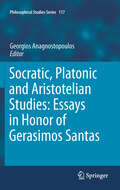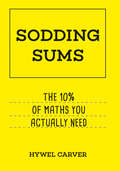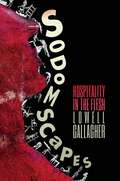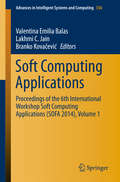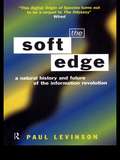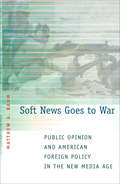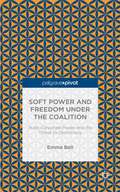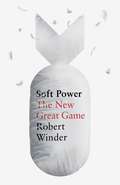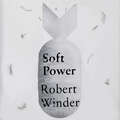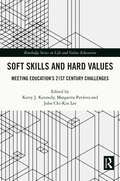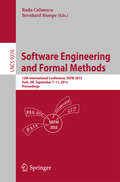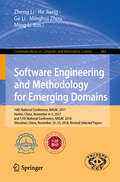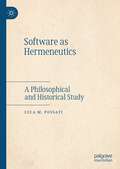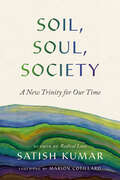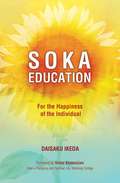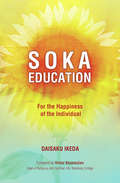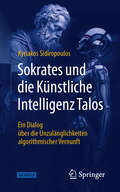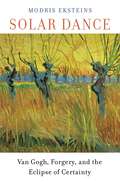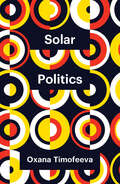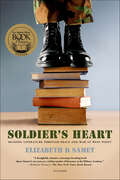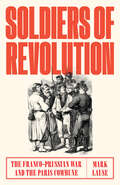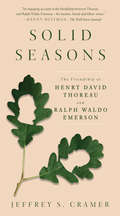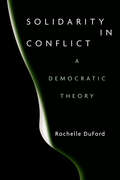- Table View
- List View
Socratic, Platonic and Aristotelian Studies: Essays in Honor of Gerasimos Santas
by Georgios AnagnostopoulosThis volume contains outstanding studies by some of the best scholars in ancient Greek Philosophy on key topics in Socratic, Platonic, and Aristotelian thought. These studies provide rigorous analyses of arguments and texts and often advance original interpretations. The essays in the volume range over a number of central themes in ancient philosophy, such as Socratic and Platonic conceptions of philosophical method; the Socratic paradoxes; Plato's view on justice; the nature of Platonic Forms, especially the Form of the Good; Aristotle's views on the faculties of the soul; Aristotle's functionalist account of the human good; Socratic, Platonic, and Aristotelian views on the nature of desire and its object. The volume will be of interest to students and scholars of ancient philosophy and classics.
Sodding Sums: The 10% of maths you actually need
by Hywel CarverMaths is a part of everyday life and there's no denying it. For anyone who has blocked distant memories of complicated algebraic formulae or incomprehensible trigonometry, numbers can strike fear at your very core. It is, however, an unavoidable part of life, so why struggle through without a clue? Hywel Carver is passionate about making maths approachable for everyone. In his go-to guide he introduces handy arithme`tricks' that help solve multiplication and division problems with rounding and approximations; explains fractions, percentages and ratios, how to convert between them and understand increases, decreases and multiplication; delves into all types of conversions - metric versus imperial, Celsius to Fahrenheit, as well as distances and speeds. These mathematical theories can then be applied to common conundrums, such as how mortgages and loans actually work, grasping an understanding of compound interest, the chances and probability of success in gambling games, and how to analyse statistics and data including causality, coincidence and correlation. Sodding Sums will subtract stress and divide difficulty so you no longer feel clueless when challenged by maths.
Sodding Sums: The 10% of maths you actually need
by Hywel CarverMaths is a part of everyday life and there's no denying it. For anyone who has blocked distant memories of complicated algebraic formulae or incomprehensible trigonometry, numbers can strike fear at your very core. It is, however, an unavoidable part of life, so why struggle through without a clue? Hywel Carver is passionate about making maths approachable for everyone. In his go-to guide he introduces handy arithme`tricks' that help solve multiplication and division problems with rounding and approximations; explains fractions, percentages and ratios, how to convert between them and understand increases, decreases and multiplication; delves into all types of conversions - metric versus imperial, Celsius to Fahrenheit, as well as distances and speeds. These mathematical theories can then be applied to common conundrums, such as how mortgages and loans actually work, grasping an understanding of compound interest, the chances and probability of success in gambling games, and how to analyse statistics and data including causality, coincidence and correlation. Sodding Sums will subtract stress and divide difficulty so you no longer feel clueless when challenged by maths.
Sodomscapes: Hospitality in the Flesh
by Lowell GallagherSodomscapes presents a fresh approach to the story of Lot’s wife, as it’s been read across cultures and generations. In the process, it reinterprets foundational concepts of ethics, representation, and the body. While the sudden mutation of Lot’s wife in the flight from Sodom is often read to confirm our antiscopic bias, a rival tradition emphasizes the counterintuitive optics required to nurture sustainable habitations for life in view of its unforeseeable contingency.Whether in medieval exegesis, Russian avant-garde art, Renaissance painting, or today’s Dead Sea health care tourism industry, the repeated desire to reclaim Lot’s wife turns the cautionary emblem of the mutating woman into a figural laboratory for testing the ethical bounds of hospitality. Sodomscape—the book’s name for this gesture—revisits touchstone moments in the history of figural thinking and places them in conversation with key thinkers of hospitality. The book’s cumulative perspective identifies Lot’s wife as the resilient figure of vigilant dwelling, whose in-betweenness discloses counterintuitive ways of understanding what counts as a life amid divergent claims of being-with and being-for.
Soft Computing Applications
by Lakhmi C. Jain Branko Kovačević Valentina Emilia BalasThese volumes constitute the Proceedings of the 6th International Workshop on Soft Computing Applications, or SOFA 2014, held on 24-26 July 2014 in Timisoara, Romania. This edition was organized by the University of Belgrade, Serbia in conjunction with Romanian Society of Control Engineering and Technical Informatics (SRAIT) - Arad Section, The General Association of Engineers in Romania - Arad Section, Institute of Computer Science, Iasi Branch of the Romanian Academy and IEEE Romanian Section. The Soft Computing concept was introduced by Lotfi Zadeh in 1991 and serves to highlight the emergence of computing methodologies in which the accent is on exploiting the tolerance for imprecision and uncertainty to achieve tractability, robustness and low solution cost. Soft computing facilitates the use of fuzzy logic, neurocomputing, evolutionary computing and probabilistic computing in combination, leading to the concept of hybrid intelligent systems. The combination of such intelligent systems tools and a large number of applications introduce a need for a synergy of scientific and technological disciplines in order to show the great potential of Soft Computing in all domains. The conference papers included in these proceedings, published post conference, were grouped into the following area of research: · Image, Text and Signal Processing Intelligent Transportation Modeling and Applications Biomedical Applications Neural Network and Applications Knowledge-Based Technologies for Web Applications, Cloud Computing, Security, Algorithms and Computer Networks Knowledge-Based Technologies Soft Computing Techniques for Time Series Analysis Soft Computing and Fuzzy Logic in Biometrics Fuzzy Applications Theory and Fuzzy Control Business Process Management Methods and Applications in Electrical Engineering The volumes provide useful information to professors, researchers and graduated students in area of soft computing techniques and applications, as they report new research work on challenging issues.
Soft Edge: A Natural History And Future Of The Information Revolution
by Paul LevinsonThe Soft Edge is a one-of-a-kind history of the information revolution. In his lucid and direct style, Paul Levinson, historian and philosopher of media and communications, gives us more than just a history of information technologies. The Soft Edge is a book about theories on the evolution of technology, the effects that human choice has on this (r)evolution, and what's in store for us in the future. Paul Levinson's engaging voice guides us on a tour that explains how communications media have been responsible for major developments in history and for profound changes in our day-to-day lives. Levinson presents the intriguing argument that technology actually becomes more human. We see how information technologies are selected on the basis of how well they meet human needs. Why is email more like speech than print is? Why didn't the arrival of television destroy the radio? These and many more thought provoking questions are answered in The Soft Edge. Boldly extending and deepening the pathways blazed by McLuhan, Paul Levinson has provided us with a brilliant and exciting study of life with our old media, our new media, and the media still to come.
Soft News Goes to War: Public Opinion and American Foreign Policy in the New Media Age
by Matthew A. BaumThe American public has consistently declared itself less concerned with foreign affairs in the post-Cold War era, even after 9/11, than at any time since World War II. How can it be, then, that public attentiveness to U.S. foreign policy crises has increased? This book represents the first systematic attempt to explain this apparent paradox. Matthew Baum argues that the answer lies in changes to television's presentation of political information. In so doing he develops a compelling "byproduct" theory of information consumption. The information revolution has fundamentally changed the way the mass media, especially television, covers foreign policy. Traditional news has been repackaged into numerous entertainment-oriented news programs and talk shows. By transforming political issues involving scandal or violence (especially attacks against America) into entertainment, the "soft news" media have actually captured more viewers who will now follow news about foreign crises, due to its entertainment value, even if they remain uninterested in foreign policy. Baum rigorously tests his theory through content analyses of traditional and soft news media coverage of various post-WWII U.S. foreign crises and statistical analyses of public opinion surveys. The results hold key implications for the future of American politics and foreign policy. For instance, watching soft news reinforces isolationism among many inattentive Americans. Scholars, political analysts, and even politicians have tended to ignore the soft news media and politically disengaged citizens. But, as this well-written book cogently demonstrates, soft news viewers represent a largely untapped reservoir of unusually persuadable voters.
Soft Power and Freedom under the Coalition: State-Corporate Power and the Threat to Democracy
by Emma BellThis study of five key policy areas, from welfare reform to foreign policy, demonstrates that the Conservative-Liberal Democrat coalition failed to fulfil its promise to reverse the rising power of the State. It exercised more subtle forms of 'soft power', often in partnership with the private sector, and to the detriment of ordinary citizens.
Soft Power: The New Great Game
by Robert WinderIn recent years the modern world has developed a brave new concept: 'soft power'. It is the power of friendly persuasion rather than command, and it invites nations to compete (as they did in the nineteenth century) to expand their 'sphere of influence' as brands in a global marketplace. In Bloody Foreigners and The Last Wolf, Robert Winder explored the way Britain was shaped first by migration, and then by hidden geographical factors. Now, in Soft Power he reveals the ways in which modern states are asserting themselves not through traditional realpolitik but through alternative means: business, language, culture, ideas, sport, education, music, even food - the texture and values of history and daily life. Moving from West to East, the book tells the story of soft power by exploring the varied ways in which it operates - from an American sheriff in Poland to an English garden in Ravello, a French vineyard in Australia, an Asian restaurant in Spain, a Chinese Friendship Hall in Sudan; the fact that fifty-eight modern heads of state were educated in Britain; the student exchange that took a teenage Deng Xiaoping to a small town on the Loire; the way that Japan could seduce the world with chic food and smart computer games. Now there may be a new twist in this Great game. With soft power's quiet ingredients - education, science, trade, cultural values - and a new emphasis on shared mutual interest, it may be the only force supple enough to tackle the challenges the future looks likely to pose - not least the slam-the-door reflexes pulling in the other direction.
Soft Power: The New Great Game
by Robert WinderIn recent years the modern world has developed a brave new concept: 'soft power'. It is the power of friendly persuasion rather than command, and it invites nations to compete (as they did in the nineteenth century) to expand their 'sphere of influence' as brands in a global marketplace. In Bloody Foreigners and The Last Wolf, Robert Winder explored the way Britain was shaped first by migration, and then by hidden geographical factors. Now, in Soft Power he reveals the ways in which modern states are asserting themselves not through traditional realpolitik but through alternative means: business, language, culture, ideas, sport, education, music, even food - the texture and values of history and daily life. Moving from West to East, the book tells the story of soft power by exploring the varied ways in which it operates - from an American sheriff in Poland to an English garden in Ravello, a French vineyard in Australia, an Asian restaurant in Spain, a Chinese Friendship Hall in Sudan; the fact that fifty-eight modern heads of state were educated in Britain; the student exchange that took a teenage Deng Xiaoping to a small town on the Loire; the way that Japan could seduce the world with chic food and smart computer games. Now there may be a new twist in this Great game. With soft power's quiet ingredients - education, science, trade, cultural values - and a new emphasis on shared mutual interest, it may be the only force supple enough to tackle the challenges the future looks likely to pose - not least the slam-the-door reflexes pulling in the other direction.
Soft Power: The New Great Game
by Robert WinderIn recent years the modern world has developed a brave new concept: 'soft power'. It is the power of friendly persuasion rather than command, and it invites nations to compete (as they did in the nineteenth century) to expand their 'sphere of influence' as brands in a global marketplace. In Bloody Foreigners and The Last Wolf, Robert Winder explored the way Britain was shaped first by migration, and then by hidden geographical factors. Now, in Soft Power he reveals the ways in which modern states are asserting themselves not through traditional realpolitik but through alternative means: business, language, culture, ideas, sport, education, music, even food - the texture and values of history and daily life. Moving from West to East, the book tells the story of soft power by exploring the varied ways in which it operates - from an American sheriff in Poland to an English garden in Ravello, a French vineyard in Australia, an Asian restaurant in Spain, a Chinese Friendship Hall in Sudan; the fact that fifty-eight modern heads of state were educated in Britain; the student exchange that took a teenage Deng Xiaoping to a small town on the Loire; the way that Japan could seduce the world with chic food and smart computer games. Now there may be a new twist in this Great game. With soft power's quiet ingredients - education, science, trade, cultural values - and a new emphasis on shared mutual interest, it may be the only force supple enough to tackle the challenges the future looks likely to pose - not least the slam-the-door reflexes pulling in the other direction.
Soft Skills and Hard Values: Meeting Education's 21st Century Challenges (Routledge Series on Life and Values Education)
by John Chi-Kin Lee Margarita Pavlova Kerry J. KennedyTo help researchers, educators and policy makers understand and support the development of 21st-century skills in schools, this edited volume explores the various iterations of "soft" skills with a particular focus on their implications for values and evaluates ways in which "soft skills" and "hard" values can be integrated. Discourse throughout the 21st century has focused on the changing nature of work, the need for new skill sets and the disruptive effects of new technologies. This has been a neo-liberal discourse that subordinated personal and individual needs to the needs of a productive workforce delivering more and more efficiencies linked to higher and higher profits. The solution is often seen to be in the development of a school curriculum that focuses on work-ready skills for an increasingly complex work environment and its demands. Agencies such as OECD and UNESCO highlight the need to link the skills agenda with complementary values. Yet this process is at a very early stage. The proponents of the Fourth Industrial Revolution (4IR) for example highlight the impact of new technologies, not just on work but also on the social world. Yet they neglect to explore the values that would be needed in these new disruptive environments. This book takes up that issue and lays out the multiple value systems that are available for this new 21st century world. It is an important resource for policy makers, academics and teachers with responsibility for a new generation.
Software Engineering and Formal Methods
by Bernhard Rumpe Radu CalinescuThis book constitutes the refereed proceedings of the 13th International Conference on Software Engineering and Formal Methods, SEFM 2015, held in York, UK, in September 2015. The 17 full papers presented together with 2 invited and 6 short papers were carefully reviewed and selected from 96 submissions. The topics of interest included the following aspects of software engineering and formal methods: program verification, testing, certification, formal specification and proof, testing and model checking, planning, modelling, and model transformation.
Software Engineering and Methodology for Emerging Domains: 16th National Conference, NASAC 2017, Harbin, China, November 4–5, 2017, and 17th National Conference, NASAC 2018, Shenzhen, China, November 23–25, 2018, Revised Selected Papers (Communications in Computer and Information Science #861)
by Ming Li Zheng Li Minghui Zhou He Jiang Ge LiThis book constitutes the thoroughly refereed proceedings of the 16th National Conference, NASAC 2017, held in Harbin, China, in November 2017, and the 17th National Conference, NASAC 2018, held in Shenzhen, China, in November 2018. The 6 revised selected papers were selected from 17 submissions for NASAC 2017, and 5 revised selected papers were selected from 20 submissions for NASAC 2018. The papers focus on all aspects of software engineering, e.g. requirements engineering, software methodologies, software analytics, software testing and evolution, and empirical studies.
Software as Hermeneutics: A Philosophical and Historical Study
by Luca M. PossatiThis book claims that continental philosophy gives us a new understanding of digital technology, and software in particular; its main thesis being that software is like a text, so it involves a hermeneutic process. A hermeneutic understanding of software allows us to explain those aspects of software that escape a strictly technical definition, such as the relationship with the user, the human being, and the social and cultural transformations that software produces. The starting point of the book is the fracture between living experience and the code. In the first chapter, the author argues that the code is the origin of the digital experience, while remaining hidden, invisible. The second chapter explores how the software can be seen as a text in Ricoeur’s sense. Before being an algorithm, code or problem solving, software is an act of interpretation. The third chapter connects software to the history of writing, following Kittler’s suggestions. The fourth chapter unifies the two parts of the book, the historical and the theoretical, from a Kantian perspective. The central thesis is that software is a form of reflective judgment, namely, digital reflective judgement.
Soil, Soul, Society: A New Trinity for Our Time
by Satish KumarIn the first US edition of Satish Kumar's classic book, we rediscover how our spiritual and social well-being connects to that of our planet.Internationally-respected peace and environment activist Satish Kumar has been gently setting the agenda for change for over 50 years. As 350.org founder Bill McKibben says, "There is no one on the planet better-equipped to make you think and rethink how you're living and how you might change." The age of sustainability is grounded on the knowledge that we ourselves are very much part of nature; that what we do to nature we in fact do to ourselves; and that the earth has a soul, which we share. Drawing on the example of Rabindranath Tagore, Kumar advocates living with awareness that our personal choices have political and poetic resonance. In this book, he inspires readers with the knowledge we are all leaders and can create change in our structures and mindsets for lasting peace and a sustainable culture and society. Celebrating an emerging global consciousness that reveres nature, the book explores how, as a global society, we need to embrace diversity and be aware of our role as pilgrims on this earth. Joyful and heart-centered, Satish Kumar reminds us that to bring about change in the world, we must embody the change we wish to see.
Soka Education: For the Happiness of the Individual
by Daisaku IkedaFrom the Japanese word meaning "to create value," this book presents a fresh perspective on the question of the ultimate purpose of education. Mixing American pragmatism and the Buddhist philosophy of respect for all life, the goal of Soka education is the lifelong happiness of the learner. Rather than offering practical classroom techniques, this book speaks to the emotional heart of both the teacher and the student. With input from philosophers and activists from several cultures, it advances the conviction that the true purpose of education is to create a peaceful world and to develop the individual character of each student in order to achieve that goal. This revised edition contains four new chapters that further elaborate on how to unlock self-motivated learning and how to empower the learner to make a difference in their communities and the world.
Soka Education: For the Happiness of the Individual
by Daisaku Ikeda Victor KazanjianFrom the Japanese word meaning "to create value," this book presents a fresh perspective on the question of the ultimate purpose of education. Mixing American pragmatism and the Buddhist philosophy of respect for all life, the goal of Soka education is the lifelong happiness of the learner. Rather than offering practical classroom techniques, this book speaks to the emotional heart of both the teacher and the student. With input from philosophers and activists from several cultures, it advances the conviction that the true purpose of education is to create a peaceful world and to develop the individual character of each student in order to achieve that goal. This revised edition contains four new chapters that further elaborate on how to unlock self-motivated learning and how to empower the learner to make a difference in their communities and the world.
Sokrates und die Künstliche Intelligenz Talos: Ein Dialog über die Unzulänglichkeiten algorithmischer Vernunft
by Kyriakos SidiropoulosDas Sachbuch stellt die Debatte über künstliche Intelligenz in einen philosophischen Rahmen und nutzt dabei den Dialog als narrative Form. Im heutigen Athen stellen Sokrates und seine Schüler Platon und Aristoteles einem fiktiven KI-System namens Talos eine Reihe von Fragen, die die Grenzen des menschlichen und maschinellen Denkens ausloten. Der Dialog lädt zur Reflexion über grundlegende Themen wie die Natur des Wissens, des Bewusstseins, der Ethik und der menschlichen und maschinellen Autonomie ein. Das Buch bietet nicht nur Einblicke in die Chancen und Herausforderungen intelligenter Maschinen, sondern regt auch zur kritischen Diskussion über die ethischen und praktischen Konsequenzen ihrer Entwicklung an. Ein inspirierender Beitrag für alle, die philosophische und gesellschaftliche Fragen der künstlichen Intelligenz besser verstehen und mitdiskutieren möchten.
Solar Dance: Van Gogh, Forgery, and the Eclipse of Certainty
by Modris EksteinsIn Modris Eksteinss hands, the interlocking stories of Vincent van Gogh and art dealer Otto Wacker reveal the origins of the fundamental uncertainty that is the hallmark of the modern era. Through the lens of Wackers sensational 1932 trial in Berlin for selling fake Van Goghs, Eksteins offers a unique narrative of Weimar Germany, the rise of Hitler, and the replacement of nineteenth-century certitude with twentieth-century doubt. Berlin after the Great War was a magnet for art and transgression. Among those it attracted was Otto Wacker, a young gay dancer turned art impresario. His sale of thirty-three forged Van Goghs and the ensuing scandal gave Van Goghs work unprecedented commercial value. It also called into question a world of defined values and standards that had already begun to erode during the war. Van Gogh emerged posthumously as a hero who rejected organized religion and other suspect sources of authority in favor of art. Self-pitying Germans saw in his biography a series of triumphs-over defeat, poverty, and meaninglessness-that spoke to them directly. Eksteins shows how the collapsing Weimar Republic that made Van Gogh famous and gave Wacker an opportunity for reinvention propelled a third misfit into the spotlight. Taking advantage of the void left by a gutted belief system, Hitler gained power by fashioning myths of mastery. Filled with characters who delight and frighten, "Solar Dance" merges cultural and political history to show how upheavals of the early twentieth century gave rise to a search for authenticity and purpose.
Solar Politics (Theory Redux)
by Oxana TimofeevaThis book is a philosophical essay on the sun. It draws on Georges Bataille’s theories of the solar economy and solar violence and demonstrates their relevance to a world affected by the COVID-19 pandemic and climate change. The sun, which, since Antiquity, has played an essential role in our utopian imaginations, is the ultimate source of energy, both productive and destructive. According to Georges Bataille, its infinite generosity can be taken as the model for human societies, which suggests an alternative to the capitalist economy with its infinite expansion, colonization, and disastrous consequences on the cosmic scale. Taking a step from solar economy to solar politics, Timofeeva locates the grounds for it in solidarity with nature, treated neither as a master nor as a slave, but as a comrade. The book will appeal to students, academics, artists, and other readers interested in the philosophy of nature, ecology, social and political theory, postcolonial and decolonial studies, and the humanities generally.
Soldier's Heart: Reading Literature Through Peace and War at West Point
by Elizabeth D. SametElizabeth D. Samet and her students learned to romanticize the army "from the stories of their fathers and from the movies." For Samet, it was the old World War II movies she used to watch on TV, while her students grew up on Braveheart and Saving Private Ryan. Unlike their teacher, however, these students, cadets at the United States Military Academy at West Point, have decided to turn make-believe into real life.West Point is a world away from Yale, where Samet attended graduate school and where nothing sufficiently prepared her for teaching literature to young men and women who were training to fight a war. Intimate and poignant, Soldier's Heart chronicles the various tensions inherent in that life as well as the ways in which war has transformed Samet's relationship to literature. Fighting in Iraq, Samet's former students share what books and movies mean to them—the poetry of Wallace Stevens, the fiction of Virginia Woolf and J. M. Coetzee, the epics of Homer, or the films of James Cagney. Their letters in turn prompt Samet to wonder exactly what she owes to cadets in the classroom.Samet arrived at West Point before September 11, 2001, and has seen the academy change dramatically. In Soldier's Heart, she reads this transformation through her own experiences and those of her students. Forcefully examining what it means to be a civilian teaching literature at a military academy, Samet also considers the role of women in the army, the dangerous tides of religious and political zeal roiling the country, the uses of the call to patriotism, and the cult of sacrifice she believes is currently paralyzing national debate. Ultimately, Samet offers an honest and original reflection on the relationship between art and life.
Soldiers of Revolution: The Franco-Prussian War and the Paris Commune
by Mark LauseHow war gave birth to revolution in the 19th centuryThe Franco-Prussian War of 1870-71 introduced new military technologies, transformed the organization of armies, and upset the continental balance of power, promulgating new regimented ideas of nationhood and conflict resolution more widely. However, the mass armies that became a new standard required mass mobilization and the arming of working people, who exercised a new power through both a German social democracy and popular insurgent French movements. As in the Russian Revolution of 1917, the Paris Commune of 1871 grew directly from the discontent among radicalized soldiers and civilians pressed into armed service on behalf of institutions they learned to mistrust. If this militarized class conflict, the brutality of the Commune's subsequent repression not only butchered the tens of thousands of Parisians but slaughtered an old utopian faith that appeals to reason and morality could resolve social tensions. War among nations became linked to revolution and revolution to armed struggle.
Solid Seasons: The Friendship of Henry David Thoreau and Ralph Waldo Emerson
by Jeffrey S. CramerA thoughtfully researched, movingly presented dual–biography of two iconic American writers, each trying to find the ideal friend with whom they could share their journey through our imperfect world.Any biography that concentrates on either Henry David Thoreau or Ralph Waldo Emerson tends to diminish the other figure, but in Solid Seasons both men remain central and equal. Through several decades of writing, friendship remained a primary theme for them both.Collecting extracts from the letters and journals of both men, as well as words written about them by their contemporaries, Jeffrey S. Cramer beautifully illustrates the full nature of their twenty–five–year dialogue. Biographers like to point at the crisis in their friendship, focusing particularly on Thoreau's disappointment in Emerson—rarely on Emerson's own disappointment in Thoreau—and leaving it there, a friendship ruptured. But the solid seasons remained, as is evident when, in 1878, Anne Burrows Gilchrist, the English writer and friend of Whitman, visited Emerson. She wrote that his memory was failing "as to recent names and topics but as is usual in such cases all the mental impressions that were made when he was in full vigour remain clear and strong." As they chatted, Emerson called to his wife, Lidian, in the next room, "What was the name of my best friend?""Henry Thoreau," she answered."Oh, yes," Emerson repeated. "Henry Thoreau."
Solidarity in Conflict: A Democratic Theory
by Rochelle DuFordDemocracy has become disentangled from our ordinary lives. Mere cooperation or ethical consumption now often stands in for a robust concept of solidarity that structures the entirety of sociality and forms the basis of democratic culture. How did democracy become something that is done only at ballot boxes and what role can solidarity play in reviving it? In Solidarity in Conflict, Rochelle DuFord presents a theory of solidarity fit for developing democratic life and a complementary theory of democracy that emerges from a society typified by solidarity. DuFord argues that solidarity is best understood as a set of relations, one agonistic and one antagonistic: the solidarity groups' internal organization and its interactions with the broader world. Such a picture of solidarity develops through careful consideration of the conflicts endemic to social relations and solidarity organizations. Examining men's rights groups, labor organizing's role in recognitional protections for LGBTQ members of society, and the debate over trans inclusion in feminist praxis, DuFord explores how conflict, in these contexts, becomes the locus of solidarity's democratic functions and thereby critiques democratic theorizing for having become either overly idealized or overly focused on building and maintaining stability. Working in the tradition of the Frankfurt School, DuFord makes a provocative case that the conflict generated by solidarity organizations can address a variety of forms of domination, oppression, and exploitation while building a democratic society.
